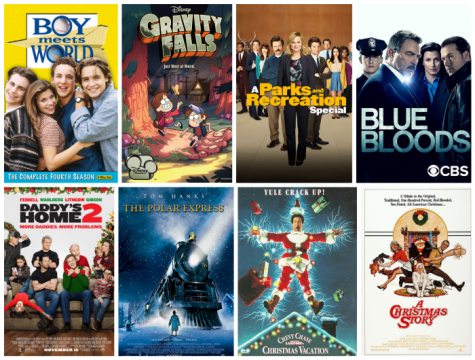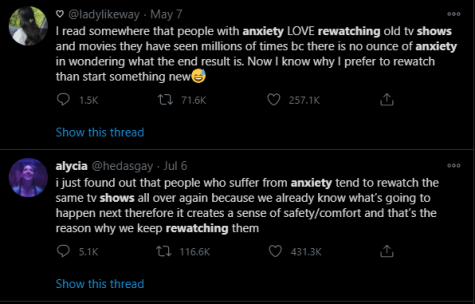The Value of Comfort Shows and Movies During Uncomfortable Times
December 18, 2020
If you, like many others, have recently found yourself drawn to shows or movies you have watched before, you aren’t alone. And psychology says there’s a reasonable explanation for it.
Bethany Herrera, psychology teacher, has a theory.
“My thought is that it ties back to operant conditioning and negative reinforcement that when you watch that show, it relieves that bit of stress that you’re feeling, and therefore it reinforces us to keep watching that show,” said Herrera.
She thinks it links back to B.F. Skinner’s concept of operant conditioning, the idea that an association is made between a behavior and either a negative or positive consequence.
“Because we’re feeling stressed, we watch that show, our stress goes away, therefore we [are] reinforced to go and watch that show again, to relieve that stress,” said Herrera. “We’re reinforcing ourselves every time we do it. And so why would we not continue to do it? Especially with the heightened stress that we feel during COVID.”
So, in this particular example, an association is made between the comfort show or movie and the positive feelings one experiences when watching it.
Lindsay Boynton, psychology teacher, has a different theory. She believes it has something to do with the mindlessness of it all.
“It doesn’t take very much cognitive energy to rewatch a show. So, when you’re feeling already, like drained from a hard day of school, because school is clearly more difficult for most people in this setting, right? It’s nice to just like, put something on, they don’t have to think about very much,” said Boynton.
People find comfort in rewatching movies and TV shows, regardless of what theory is correct.

“When I watch shows over, it’s typically because I want to relive how I felt watching it the first time or because I want to remember the stuff that happened in it,” said Brendan Losurdo, freshman.
During quarantine, he rewatched season one of “Umbrella Academy” in preparation for season two, which dropped on Netflix on July 31.
For Losurdo, “Boy Meets World” is his comfort show of choice, “and I have probably seen that series about like, six times all the way through, because it’s just so relatable…they have those problems that people face every day, and it’s just very comforting to know that you’re not alone because, obviously, these writers have experienced some of this stuff if they’re writing about it in the show,” said Losurdo.
Junior Celia D’Agostino’s primary comfort show is “Parks and Recreation,” and she feels similarly to Losurdo.
“Anytime I feel stressed, I always just watch like Parks and Rec again because I’ve watched it so many times. And because like, for me, it’s just a nice little like, comfort. I know what’s going to happen. It’s not stressing me out. It’s a very lighthearted show. It’s very lighthearted. And so I would just kind of watch it whenever I was feeling stressed, or if I didn’t feel like doing like a certain stressful assignment. I just like watch an episode of that show, and it would make me feel very epic,” said D’Agostino.

In both May and July of this year, two tweets–pictured above–went viral. With hundreds of thousands of both likes and retweets, people found them very relatable.
Boynton speaks on the tweet’s accuracy.
“I absolutely agree with the sentiment that rewatching things where you already know what’s going to happen is going to reduce your anxiety, right? There’s not going to be something crazy that happens in the show that you’re not expecting. So, if you’re already in a time of heightened anxiety, watching something again is going to bring you comfort and reduce your anxiety. I would 100% agree with the tweet,” said Boynton.
Although Herrera doesn’t have any research that supports the tweet, she feels similarly to Boynton, based on her knowledge.
“I don’t know that I have researched that with support that’s true. But I do know that, you know, especially in a time where our world is not predictable, having some sort of predictable thing we can depend on something where we know what’s going to happen, we know how it’s going to end, we know how it’s going to make us feel. That gives us a sense of control,” said Herrera.
Herrera cites psychologist Martin Seligman’s idea of locus of control, specifically external locus of control, as a possible explanation. Seligman asked the question: can people give up before they even start?
He theorized that the answer lies within the person’s perspective.
An internal locus of control means that you believe that you control your own fate. An external locus of control means that you think that outside forces dictate your fate. Too much external locus of control can lead to learned helplessness, the belief that your own actions don’t control anything.
“When we talk about that locus of control in class, you know, having an external locus of control lead you to learn helplessness, leads you to give up when things are so easy right in front of you, that if somehow we can take control over any little piece of our lives, the better off we can be,” said Herrera. “Absolutely, I agree with that tweet…This sense of control in our life does help us to be better, help us feel better, help us to better to act better.”
D’Agostino has Generalized Anxiety Disorder, and she said that rewatching shows is a way she copes due to the comforting familiarity in the characters and story.
“It’s totally great to know that something is going to happen, like what’s happening next because then you’re not like, so scared for like what might possibly happen and how it’s all going to play out. But, then again, it is exciting to sort of feel that, ‘oh, what’s going to happen next?’ However, more recently, because of pandemic stuff, it’s very nice to know what’s happening next, and that’s why I feel a lot of people are rewatching,” said Losurdo.
These ideas are similar to the reason people watch the same holiday movies year after year.
“I definitely think some family movies have the same purpose, right? They are comforting. They’re fun. A lot of families also incorporate them as like holiday traditions. So they might watch a certain one every year together,” said Boynton.
For Boynton, she grew up watching “Santa Claus.”
Because of this, it “was one of my favorite Christmas movies growing up, and it still is one of my favorites.”
“I do think it has a similar meaning to rewatching a show that you love with maybe a little bit more foundation in tradition, and like family togetherness. Like, I think [Boynton’s husband] and I are more likely to sit down and watch a Christmas movie together than a comforting TV show because we find different TV shows comforting,” said Boynton.
Herrera echoes this sentiment.
“I think it ties to like associations we make…or [when] you watch that movie, and it reminds you of it snowing outside and being together with your extended family, warm and cozy. So all sudden, watching that movie gives you those similar warm and cozy feelings,” said Herera. “So, I certainly think that there is that nostalgia, that’s also called classical conditioning or associations that you’ve made with those experiences, for sure.”
D’Agostino’s family always watches “The Polar Express.”
“And so it was mostly like the nostalgia of that movie, and we watch it, like every year now. And it’s always a really nice experience. And just, like, watch it after a while and you’re like, ‘Oh, I don’t understand. Like, maybe this wasn’t that great of a movie.’ And then you watch it and you like realize, ‘Oh, yeah, this is why I liked it because of these, like, specific nostalgic reasons,’” said D’Agostino.
“It’s mostly just like the nostalgia. It just makes you feel good. It kind of makes it feel more like Christmas when you watch those movies. Because it becomes like a part of like the Christmas routine in your family and like the Christmas tradition,” said D’Agostino.
Rewatching shows and movies are always a way of self-care, but during a pandemic, when stress and anxiety are exacerbated, this practice becomes that much more valuable and, arguably, necessary.
“That escapism, that just watching movies and TV shows [provides] just overall really helps everyone when they’re having tough times, and it’s more important now than ever. So, I mean, I’m glad companies are still pushing out work and making it as accessible as possible because we need that right now,” said Losurdo.


